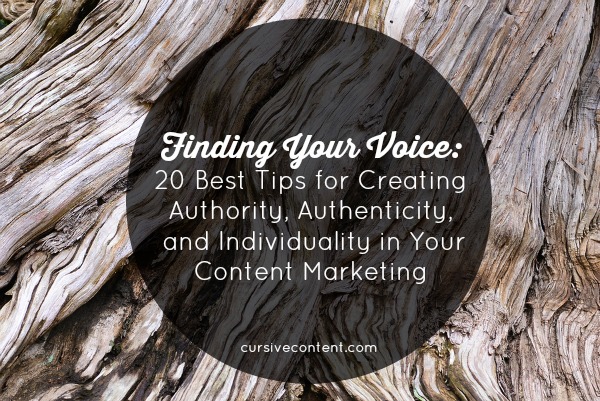Finding Your Voice: 20 Best Tips for Creating Authority, Authenticity and Individuality in Your Content Marketing

In college, I interned at a local radio station. It was intended to be a marketing internship, but then I was asked the question I never thought I would be asked: “How do you feel about being an on-air intern?”
It was a huge (seriously, I mean HUGE) step outside of my comfort zone. At first, I didn’t know how to act. I knew I needed to be interesting. But was I supposed to be funny? Outspoken? Controversial? The dumb, ditzy college girl?
I’m not naturally any of those things, and I floundered for a bit until I realized all I had to do was be me. Sure, in some ways it was the radio-morning-show version of me, but still, it felt natural. Authentic. It was my unique voice, even if it took me a while to find it.
The same panicked reach to be somebody else seems to hit businesses as they enter content marketing. The first instinct is to imitate, speak quietly and not make any waves. As a result —surprise — the content doesn’t stand out, doesn’t get noticed, and doesn’t even feel like it comes from the company who is behind it.
There is too much content out there for this type of approach. Content marketing is only worthwhile if it is true to you, but that mindset can be hard to develop. That’s why we’ve pulled together these 20 outstanding tips on building authority, creating an authentic approach and showcasing individuality.
1. “To gain business with your blog you should stop thinking like a salesman and start acting like your reader’s mentor. A salesman wonders how to get his next sale. A mentor cares about his students. He wants to help them get ahead and live a more fulfilled life. By providing solid advice on a regular basis, you build authority and trust; and that’s how you win new customers.” — Henneke Duistermaat for Kissmetrics
2. “What makes your perspective unique and different from the millions of other blogs that are out there? Why should readers trust your voice? If you are a business owner, it’s rare to start a blog before you’ve established customers. So clearly, you have experience in your field of business. Just like you tap into your passion with the overall strategy, make the most out of your experience and be sure to offer a unique perspective. Don’t just say what everyone else is saying. Often, disruption can breed success.” — Lou Dubois for Inc.
3. “The language of marketing is notorious for feeling artificial. Generic product attributes and abstract business-speak is forced. Believe us when we say no one really cares about “quality manufacturing” or “industry-leading service levels” unless they know exactly how that feels and believe what you say about your brand. When using stories as a vehicle for content marketing, take this advice from the Story2 Moments Method®: Stand in front of a mirror, look yourself in the eye, and tell your brand story out loud. Do you believe it? Now tell a friend or family member face-to-face. Does it connect with the listener? If the answers are ‘yes,’ take that authentic story in your voice and write it down. In authentic storytelling there’s no need to ‘business-fy’ it.” — Carol Barash for Content Marketing Institute
4. “Everyone loves a good story. When you free yourself to write a story, you’re freeing your own unique and unforgettable voice.”— Neil Patel for HubSpot
5. “You can work hard to polish your blog posts. To drive people to your blog. To generate SEO traffic. To boost social media shares. But the key to your business blogging success remains: Have ideas that are worth spreading. Don’t be afraid to be different. Don’t be afraid to be opinionated. Don’t be afraid to be yourself. Let your personality shine through and write with passion. That’s how you woo your readers and win business.” — Henneke Duistermaat for Copyblogger
6. “Authenticity is being human. It’s that simple. It has nothing to do with being original or unique. Professional content marketing is selling the human in your business to the humans who buy from your business.” — Ryan Hanley
7. “Good writing is specific – highly sensitive to content, context, audience and agenda. There may not be only one ‘right note’ for each piece, but there does need to be one target. As a writer, you need to know exactly what tone you’re aiming for (even if you don’t pause to describe it). It’s like choosing a key in music. Or choosing the tuning of your instrument. When I’m in control, I know the tuning. When I lose that – go out of tune – it’s often because I’m faking authority by writing about something I don’t fully understand.” — Doug Kessler for Velocity
8.”Accepting that you are not perfect but a product of a life journey can empower you to realize, write and reveal the naked you. People will find a voice that is transparent and full of bumps, scrapes and scratches with a rich voice tapestry much more interesting than a mass produced sound of blandness.” — Jeff Bullas for JeffBullas.com
9. “Choose your story […] wisely, because you have to live with it for a long time, and if it’s not authentic, if it doesn’t hold up, you’re left with nothing.” — Seth Godin
10. “It’s not all about what you sell, it’s who you are and what that means for your customers. When you’re honest about your brand’s story and share it in all content (blog, website copy, emails, etc.), you’ll attract the right audience.” — Monica Montesa for AWeber
11. “If you’re already blogging, look back at some of your most popular posts and ask yourself, ‘What kind of mood was I in when I wrote this? What emotions am I portraying here?’ Observe the vocabulary you used, even the punctuation and formatting style. These are all essential elements in creating a voice for your blog. The trick here is replicate what you were doing when you were successful and do it again (and again).” — Jeff Goins for ProBlogger
12. “It’s easy to be authentic when you truly understand your customers and their most pressing concerns. With that understanding, authenticity comes naturally. By combining genuine understanding with narrative skills, you can tell memorable and compelling stories that will be meaningful to your customers.” — Newt Barrett, as quoted by Lisa Arthur for Forbes
13. “The power in authenticity, whether in your brand or person, is that it leaves no questions unanswered. People know where you stand, what you’re made of and what is important to you. Authenticity helps you define how they see you, without risking they’ll be confused.” — Jason Falls via Convince & Convert
14. “While your audience should certainly be front and center, there is a lot to be said for keeping some focus on your passions, as well. We can all discern which authors are truly interested in what they are writing about and which ones are just creating content to ‘check a box’ in their marketing strategy (I don’t even need to ask which type we are all more likely to be drawn to.)” — Michele Linn for Content Marketing Institute
15. “Authenticity rules. Solutions rule. Not your company. Not you.” — Wayne O’Neill as quoted by Terri Hoffman for Marketing Refresh
16. “Just like each and every one of your clients you and your business are unique, and you will have your own thresholds regarding what and how much you are willing to share in order to build your authenticity. This knowledge also helps you be selective about your marketing. Poorly considered content, or content with little value (like sharing what you had for breakfast) will do little for building your reputation, and may in fact have a negative effect. Equally don’t feel obliged to share more than you are comfortable with – there’s no need to give away the secret ingredients to mama’s special sauce.” — James T. Noble for Kissmetrics
17. “Authenticity means more show, less tell.” — Tom Fishburne for Marketoonist
18. “Make your brand relevant by showcasing how your brand story fits within the larger context of your audiences’ needs and interests. Don’t just tell your audiences what your brand is all about – show them. Make it real and authentic.” — Emily Cretella for Cursive Content Marketing
19. “Integrating super personalized marketing into your strategy is a way for your business to say, “I’m listening. I know what you want, I know what you need, and I know what you enjoy.” The more your business shows this to a customer or prospect, the more likely they will be to connect with you and become a promoter of your business.” — Jess Marranco for HubSpot
20. “Building your brand authority involves a certain professionalism, but that doesn’t mean your copy needs to be full of longwinded sentences and obscure words. If you want to stand out from the crowd, your copy needs to speak to people in a way they can relate to.”— Jamie Thomson for MarketingProfs
Looking for more indispensable content marketing tips? Browse our 20 Best Tips series.
MORE ARTICLES
- 20 Best Productivity Tips for Small Businesses
- Feeling Blah? Get Your Groove Back with These 3 Tips
- Happy Holidays from Cursive Content Marketing
- This Is What Happens When the World’s Fastest Growing Fitness Craze Thinks Outside the Box
- 20 Best Tips for Setting, Tracking and Measuring Content Marketing Goals
- Content Marketing Summer School for School Communicators: Top Article Roundup
- What Does the Term "Content Marketing" Mean to You?
-
 4 Independent Schools with A+ Content Marketing
4 Independent Schools with A+ Content Marketing
[…] few key facts can lend a strong voice of authority to your content and raise it to a higher level of […]
This is very useful. This article covers everything!
[…] you should stop thinking like a salesman and start acting like your reader’s mentor,” says Henneke Duistermaat of Kissmetrics. “A salesman wonders how to get his next sale. A mentor cares about his […]
[…] your blog you should stop thinking like a salesman and start acting like your reader’s mentor,” says Henneke Duistermaat of Kissmetrics. “A salesman wonders how to get his next sale. A mentor cares about his students. […]
[…] your blog you should stop thinking like a salesman and start acting like your reader’s mentor,” says Henneke Duistermaat of Kissmetrics. “A salesman wonders how to get his next sale. A mentor cares about his students. […]